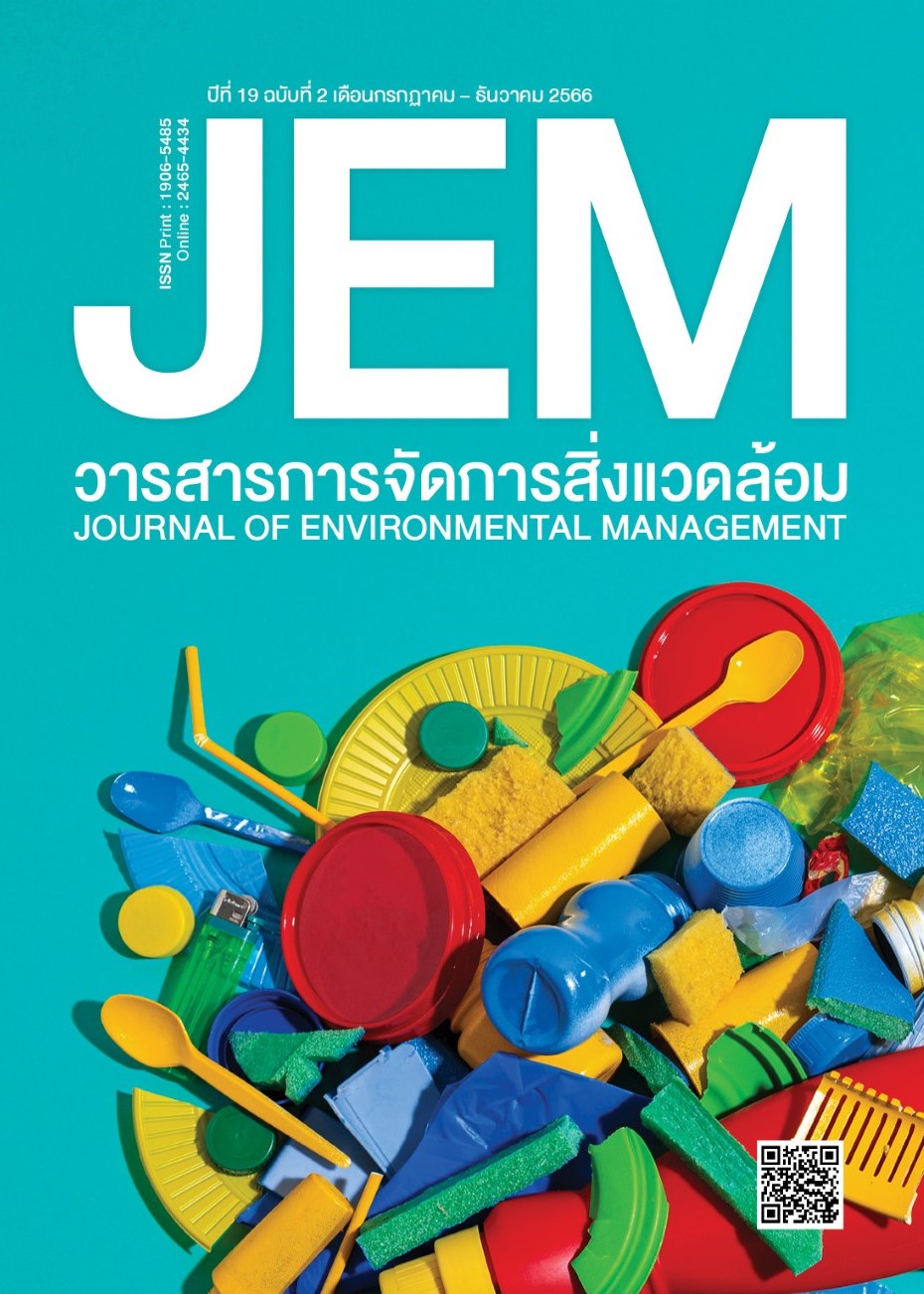มุมมองของผู้ประกอบการไทยต่อการขอรับรองเครื่องหมายฉลากเขียว
DOI:
https://doi.org/10.14456/jem.2023.13คำสำคัญ:
มุมมอง, กระบวนการตัดสินใจซื้อ, ฉลากเขียว, ผู้ประกอบการไทย, การจัดการองค์กรบทคัดย่อ
งานวิจัยนี้มีวัตถุประสงค์เพื่อศึกษา 1) กระบวนการตัดสินใจขอรับรองฉลากเขียว 2) ความคิดเห็นต่อมุมมองของผู้ประกอบการที่ขอรับรองต่อเนื่องเกี่ยวกับขั้นตอนและประโยชน์ และ 3) ความคิดเห็นต่อมุมมองของผู้ที่ไม่เคยขอรับรอง เป็นการวิจัยเชิงปริมาณ สำรวจผู้ประกอบการไทย 100 บริษัท โดยสุ่มตัวอย่างแบบเจาะจงกับผู้ที่ขอต่อเนื่อง 47 บริษัท และสุ่มตามสะดวกกับผู้ที่ไม่เคยขอยื่น 53 บริษัท ใช้สถิติเชิงพรรณาและทดสอบสมมติฐานด้วยค่า F-test เก็บข้อมูลจากแบบสอบถามที่ผ่านการตรวจสอบคุณภาพจากผู้ทรงคุณวุฒิของสถาบันสิ่งแวดล้อมไทย พบว่า 1) กระบวนการตัดสินใจขอรับรองฉลากเขียวของผู้ประกอบการที่ขอต่อเนื่อง เป็นดังนี้ ต้องการสร้างภาพลักษณ์ที่ดีมากที่สุด หาข้อมูลด้วยการติดต่อโดยตรงและผ่านเว็บไซต์สถาบัน ประเมินโดยคำนึงถึงความคุ้มค่า ส่วนใหญ่ตัดสินใจทันที หลังใช้บริการขอรับรองฉลากเขียวมีความพึงพอใจ บอกต่อ และตั้งใจต่ออายุ 2) ผู้ประกอบการที่ขอรับรองต่อเนื่อง ส่วนใหญ่เห็นว่า ขั้นตอนรับสมัคร ค่าธรรมเนียม หลักเกณฑ์และเงื่อนไข มีความเหมาะสม และได้ประโยชน์ตามที่คาดหวัง 3) ผู้ประกอบการที่ไม่เคยขอยื่น ส่วนใหญ่มีความรู้และความเข้าใจในระดับพอใช้ สนใจที่จะขอรับรองในระดับมากและคาดหวังว่าผู้บริโภคจะพึงพอใจมาก ส่วนเหตุผลที่ยังไม่ขอรับรอง เพราะไม่ทราบรายละเอียดและเกรงว่าจะมีค่าใช้จ่ายสูง ช่องทางที่ต้องการรับข้อมูล ได้แก่ เฟซบุ๊กและเว็บไซต์
เอกสารอ้างอิง
Bangkokbiznews Online. (2020). The Securities and Exchange Commission: Opening sustainability disclosurearticles are truly important. Retrieved October 4, 2021, from https://www.bangkokbiznews.com/news/892978.
Bunprom, P. (2010). Tools for Sustainable Environmental Management. Suthiparithat Journal,24(73), 169 –184.
Chaiprasit, C. (2021). Global Consumer Insights Pulse Survey: Thai consumers are willing to pay for greener goods that incorporate more ESG concepts. Retrieved August 27, 2021, from https://www.pwc.com/th/en/press-room/press-release/2021/press-release-02-07-21-th.html.
Chookhuan, C. (2021). Guidelines for Promoting the Consumption of Eco-friendly Products during the COVID-19 Pandemic. Master of Science (Environmental Management), National Institute of Development Administration.
Inthasang, C., Sinthusiri, N., & Chaisena, Y. (2020). Green Product and Green Perceived Value Effect on Purchase Intentions. WMS Journal of Management Walailak University, 9(3), 31-41.
Kasikorn Research Center. (2021). Consumers are willing to pay for Green products and Services. Retrieved August 30, 2021, from https://kasikornresearch.com/th/analysis/k-social-media/Pages/Green-FB-12-10-21.aspx.
Kotler, P. (2003). Marketing Management (11th ed.). Prentice-Hall: Upper Saddle River.
Lakkhongka, K. (2022). Consumer Behavior in Green Marketing and its Influence on the Business Environment. Journal of ASEAN PLUS Studies, 3(2), 13-22.
Mungcharoen, T. (2021). New Generations: The Driving Force for Achieving Sustainable Lifestyles in Thailand. An online Forum.
Office of Natural Resources and Environmental Policy and Planning (ONEP). (n.d.). Sustainable Consumption and Production Roadmap 2017-2037 (Revised Version 1). Bangkok: Thammasat University Research and Consultancy Institute.
Ogaji, A. (2020). Business Sustainability Strategies and Competitive Advantage. Retrieved May 30, 2023, from https://ligsuniversity.com/blog/business-sustainability-strategies-andcompetitive-advantage.
Pinturong, S. (2020). Attitude and behavior towards green Marketing for Thai consumer. Master of Management degree thesis, Mahidol University.
Rattanasereekiat, S. (2012). Theories of Motivation. Retrieved May 30, 2023, from http://pmcexpert.com/-theories-of-motivation/.
Silalertruksa, T. (2020). The role of industry in sustainable consumption and production. Retrieved August 30, 2020, from https://www.greennetworkthailand.com.
Thailand Environment Institute. (2021). The Thai Green Label Guide. Retrieved August 27, 2021,from http://www.tei.or.th/file/library/book- Greenlabel_40.pdf.
Thailand Environment Institute. (n.d.). The Thai Green Label Scheme’ s Requirements of Heat Pump. Retrieved August 27, 2021, from https://www.tei.or.th/greenlabel/download/TGL-57-11.pdf
Thongmit, P. (2020, May). How to Develop Green-Label Utilization among Stakeholders Based On Sustainable Development Scheme. In Assoc. Prof. Dr. Wiphat Thongsut (Chair), The 7th National Conference Nakhonratchasima College (The 7th NMCCON 2020): Innovation for Health and Society in the Digital Age. Research and Development Office, Nakhonratchasima College. Retrieved March 2023, from http://journal.nmc.ac.th/th/admin/Journal/2563Vol11No1_40.pdf.
Trairatvorakul, P. (2017). Thailand’s Sustainable Business Guide: How to Future Proof Your Business in The Name of a Better World. Bangkok: Sirivatana Interprint Public Co., Ltd.
Udomtanateera, K. (2019). Ministerial Regulation on the Characteristics of Small and Medium Enterprises B.E. 2562. Retrieved July 1, 2021, from https://www.iok2u.com/news/news-etc/laws-sme-2562.



